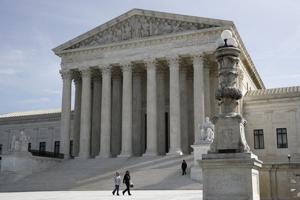(The Center Square) – Even though the U.S. Supreme Court has ended the pandemic-related federal moratorium on residential evictions, the Illinois moratorium continues.
The Centers for Disease Control and Prevention health order had banned evictions nationwide in areas with high COVID-19 transmission rates.
“In light of the Supreme Court ruling and the continue risk of COVID-19 transmission, President Biden is once again calling on all entities that can prevent evictions, from cities and states to local courts, landlords, Cabinet agencies, to urgently prevent evictions,” White House spokesperson Jen Psaki said.
Gov. J.B. Pritzker recently extended the ban until September 18. The extended statewide moratorium applies to all Illinois counties, including areas reporting low transmission rates. The governor’s office previously said it would be phasing out the moratorium.
Housing advocates says the moratorium extension will give tenants and landlords more time to connect with rental assistance funds that are available.
While the moratorium prevents the enforcement of an eviction order, property owners and landlords can still file for eviction in court or challenge a tenant’s written declaration that they fell behind in paying rent due to the pandemic. But, the moratorium prevents final trials and judgments from taking place in eviction hearings.
Michael Glasser, president of the Illinois-based Neighborhood Building Owners Alliance, said housing providers prefer not to go through the long and painful, legal process of eviction.
“Just having the ability to evict gives us a tool that we need to kind of wake up and shake up some of the tenants who have been milking this process,” Glasser said.
Glasser warned of a pending debt tsunami once the moratorium is lifted.
“Tenants owe billions in back rent, and the burden of that debt on neighborhood housing providers has drained their resources and impacted their ability to invest and maintain the homes that their tenants live in,” Glasser said.
Nearly 6.4 million U.S. households now cumulatively owe more than $21 billion in back rent, according to an estimate by the National Equity Atlas created by PolicyLink.
Tony Nudo, from the Springfield Area Landlord Association, told WMAY that with the statewide moratorium still in place, it is impossible to go after bad tenants.
“You can’t get a court date at this time for evictions concerning money and it is very difficult to know what is going to happen in the future,” Nudo said.







